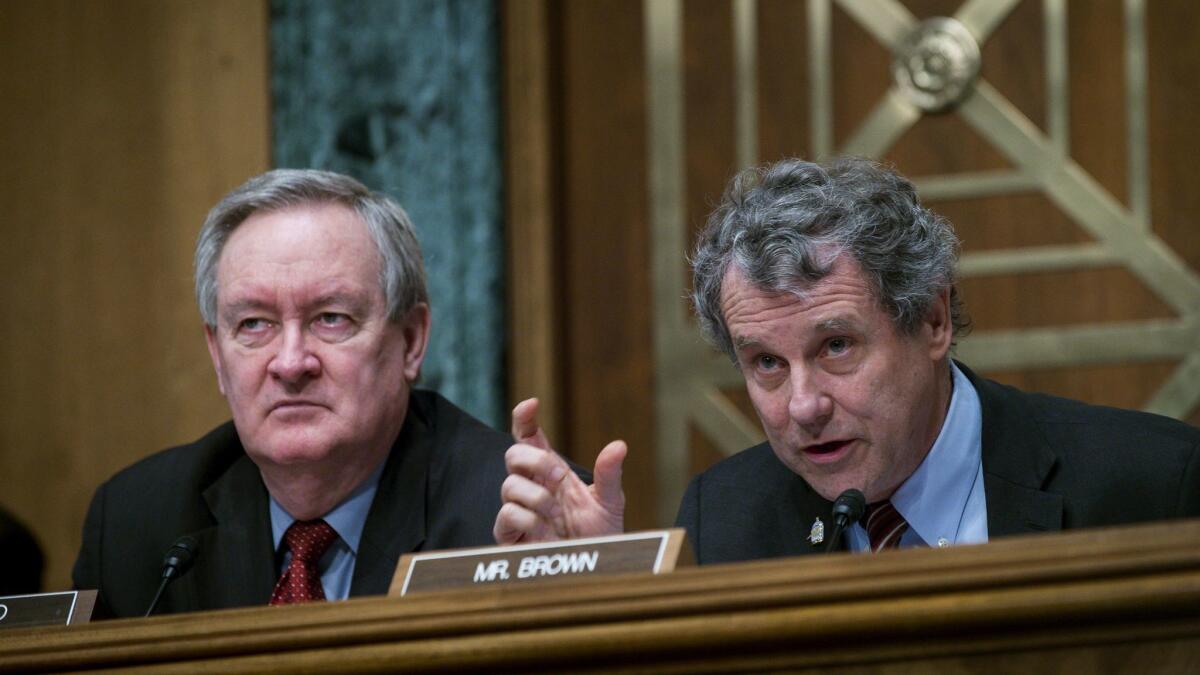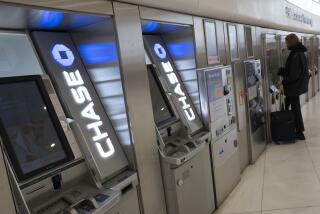Some Democrats are ready to loosen tough bank regulations put in place after the financial crisis

Reporting from Washington — Before the 2008 financial crisis, BAC Community Bank in Stockton made about 100 mortgage loans a year. Now, after new regulations mandated in the Dodd-Frank Wall Street Reform and Consumer Protection Act, the figure is down to about two dozen.
“We were never a big mortgage lender, but we did quite a bit more before Dodd-Frank,” said Bill Trezza, the bank’s chief executive. “It basically pushed us out of that to the point where we will do mortgages only for our customers if they request it.”
He and other small bankers hope that’s about to change. And a political shift is making that possible.
Nearly a decade after the financial crisis, some Democrats are ready to go along with a Republican push to significantly loosen the landmark law enacted to try to prevent the next one.
Senate legislation focused on easing new mortgage and other rules for small and mid-sized and regional banks has been co-sponsored by a dozen Democrats, several of them moderates up for re-election this year in states won by President Trump in the 2016 campaign.
The bipartisan support has the bill on track to be approved as soon as this week in what would be the first major overhaul of the 2010 Dodd-Frank Wall Street Reform and Consumer Protection Act.
The House, which has approved more extensive financial deregulation, is likely to go along with the Senate’s more modest changes. Trump, who has called Dodd-Frank “a very negative force” in the economy and vowed during the campaign to dismantle it, would be expected to sign any bill that reduces its authority.
“The tone has shifted in D.C. from where regulation was necessary to protect the economy to the concern where regulation has gone too far and might be a drag on the economy,” said Ed Mills, a Washington policy analyst for financial services firm Raymond James. “Where that shift has occurred, it gave an opening to the smaller and medium-size banks to pursue these changes.”
But while there’s broad support for easing unintentional burdens in the law for small banks, many liberal Democrats are fighting the bill from Senate Banking Committee Chairman Mike Crapo (R-Idaho). They say it goes too far by also providing significant benefits for some larger financial institutions.
The legislation would exempt about 30 banks and other firms from the stricter oversight put in place by Dodd-Frank after the 2008 financial crisis. That 2010 law was an attempt to prevent a repeat of the bailouts and damage to the economy.
“Republicans – and some Democrats – seem to have forgotten all about the 2008 financial crisis,” Sen. Elizabeth Warren (D-Mass.) said in a fundraising alert sent to her supporters last week highlighting the split in the party over the bill. “Senators are lining up to roll back the Wall Street reform legislation we fought for in 2010 and let these giant banks go back to gambling with our economy.”
Most of the bill’s provisions are designed to ease burdens on small banks, including reducing new mortgage requirements for institutions that make fewer than 500 such loans a year.
Smaller banks — those with less than $10 billion in assets — also would be exempted from the Volcker Rule, which prohibits federally insured institutions from trading for their own profit and limits their ownership of risky investments. Paul Volcker, the former Federal Reserve chairman who advocated for the rule in Dodd-Frank, publicly supports that change.
The bill also adds new protections in the wake of the massive Equifax Inc. data breach, requiring credit reporting companies to provide consumers with free credit freezes on their files and to provide free credit monitoring for active-duty members of the military. Credit reporting companies now have more limited freeze options.
In December, the Senate Banking Committee approved the bill 16-7. All 12 of the panel’s Republicans joined with four Democrats — Joe Donnelly of Indiana, Heidi Heitkamp of North Dakota, Jon Tester of Montana and Mark Warner of Virginia — in approving the measure.
“Dodd-Frank cracked down on risky financial behavior, but it also had some unintended consequences,” Tester said in voting for the bill. “And like any piece of major legislation… it is critical that we check under the hood from time to time and ensure that it’s doing what it was intended to do.”
Donnelly, Heitkamp and Tester are moderates running for re-election this year in states Trump handily won in 2016, as are two other Democrats not on the committee — Claire McCaskill of Missouri and Joe Manchin of West Virginia — who are cosponsoring the bill.
“If you’re a moderate Democrat from a red state, being on the opposite side of Elizabeth Warren has political benefit,” Mills said. “The truth of the matter is that most of these changes are fairly esoteric and fairly technical and you don’t have the same populist environment, anti-Wall Street rallying cry you had previously.”
Paul Merski, who oversees congressional relations and strategy for the Independent Community Bankers of America, said the bill strikes the right balance in providing most of its relief to small banks.
“It doesn’t do everything everyone wants on either side of the aisle,” he said. “It’s the right mix to attract bipartisan support.”
But Volcker, other former regulators and many liberal Democrats are concerned with the bill’s changes that go beyond smaller banks. The most significant provision would reduce the number of financial institutions that face more intense scrutiny in the wake of the 2008 crisis.
The legislation would raise the threshold for so-called systemically important financial institutions, which face mandatory and rigorous annual stress tests and other heightened oversight, to $250 billion in assets from the current $50-billion level.
That would provide significant relief for large firms such as State Street Corp., Charles Schwab Corp., Suntrust Banks Inc., and American Express Co., as well as U.S. operations of giant foreign banks, including Credit Suisse, Deutsche Bank and Barclays.
There would be no changes to the strict oversight of JPMorgan Chase & Co., Bank of America Corp., Wells Fargo & Co. and the other largest banks in the U.S. The Federal Reserve would retain the ability to apply heightened oversight to banks with assets between $50 billion and $250 billion, it just would no longer be automatic.
Volcker said the $250-billion threshold is too high for potential regulatory relief and suggested a $100-billion level. He and Sheila Bair, who chaired the Federal Deposit Insurance Corp. during the financial crisis, also have concerns about a provision that would reduce a key ratio of bank leverage for some of the largest financial firms.
Bair, a Republican, said Dodd-Frank “did overshoot with the small banks” and she supports revisions to provide relief. But the change to the so-called supplemental leverage ratio for large banks goes too far because it would allow them to reduce the capital they would need to withstand a future crisis, she said.
“You’re fat, you’re happy, you’re profitable, you just got a big tax cut… and we’re going to do this too?” Bair said of the big banks.
“These are good times. We have economic growth,” she said. “You need to be building your capital buffers because in a few years things are going to turn down again and we don’t want to have to bail you out again.”
On Monday night, the Congressional Budget Office estimated the bill would add $671 million to the federal budget deficit over the next decade, largely because the changes would slightly increase the small chance that a systemically important financial institution would fail or a financial crisis would take place.
The report shows that “this bank giveaway bill will cost taxpayers,” said Sen. Sherrod Brown (D-Ohio), who is helping lead opposition to the legislation.
Trezza said the bill’s changes will help BAC Community Bank, which has about $640 million in assets. He estimated the cost to comply with regulations has tripled over the past 20 years, to about $1 million a year at a bank that makes only about $4 million annually.
Much of that is because of Dodd-Frank. The Senate bill’s revised mortgage rules, including an exemption on appraisals for purchases of $400,000 or less in rural areas where certified appraisers are difficult to find, will help BAC make more loans, Trezza said.
“They’re actually going back and trying to tailor the regulations so they’re only applicable where there’s a meaningful risk,” he said. “Whatever applied to Citibank applied to me. Sometimes that fits. A lot of times, that doesn’t.”
Twitter: @JimPuzzanghera
More to Read
Inside the business of entertainment
The Wide Shot brings you news, analysis and insights on everything from streaming wars to production — and what it all means for the future.
You may occasionally receive promotional content from the Los Angeles Times.











